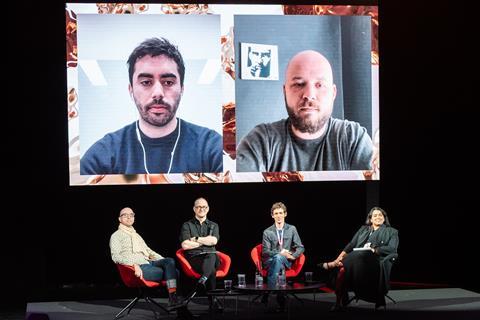
A plea for creators to adopt a more positive view of artificial intelligence was one of the key take-aways from a panel discussion on the technology at the 2023 Geneva Digital Market (GDM).
Named ‘Dreams and Chimeras of Artificial Intelligence,’ the panel ran as part of the Machine Learning x Audiovisuel talks programme Monday (Nov. 6).
The use of AI in the creative industries has been a hot topic in recent months, with the writers’ and actors’ strikes in the US both in part concerning the implementation of AI technologies.
Moderator Sten-Kristian Saluveer, head of Cannes Next and strategic advisor to the Marche du Film, asked Sam Pressman, CEO of US company Pressman Film - son of legendary indie film producer Ed Pressman who died earlier this year - how he feels as a producer.
“Where we are going is undefined and that is both exciting and terrifying. As a producer, I’m trying to continue in my father’s legacy which is empowering filmmakers to make their independent visions possible. I think a producer’s purpose is to be a champion of the artist,” said Pressman. “Looking at the landscape of film today, it is so challenging to get any film made throughout history, it’s been a miracle to make anything. What’s so exciting about these tools is the way that they democratise and allow a kid in Cleveland or a young kid in Mexico City to play with a production of a scale that was until today completely unimaginable.”
Joining via video link from Los Angeles, Pressman has been investigating the use of AI in storytelling. He launched an AI-generated short film In Search of Time, co-created by Pierre Zandrowicz and Matt Tierney, at Tribeca earlier this year.
Pressman told the audience that any notion that the content is not an art form if AI technology is being used is “off base”. He pointed out In Search Of Time combined imagery from an iPhone with open-source AI platform Stable Diffusion, to create a memory of a father and son. “A memory of the meaning of what the moments of truth in childhood and how plastic and malleable they are, it was a beautiful way to blend the technology and the human,” Pressman said.
Fellow panelist Cristobal Valenzuela, co-founder and CEO of Runway, an applied AI research company, has created a campus for documentary filmmakers using AI.
“These are tools for storytelling, and it’s how you shape them and how you use them that matters more than how they work,” said Valenzuela via video link. “For documentary filmmakers, for example, sometimes footage doesn’t exist of a story you want to tell.” AI can help create imagery and footage from human descriptions of history, incidents and recollections.
“We need to shift in our view. The best thing to do collectively as an industry is invent better stories with AI,” Valenzuela said. He pointed out that most stories about AI are dark science fiction tales such as The Terminator or Black Mirror “that drive people’s imagination towards the most fantastical, horrible outcomes possible with technology.”
A former researcher at NYU Tisch School of Arts, Valenzuela called for artists to create positive futures. “It’s really important to understand the responsibility that artists and filmmakers, and everyone that knows how to tell stories, has when it comes to fiction or nonfiction, to help drive a much more impactful usage of technology.”
Writer and art curator Nora Nahid Khan invited writers, artists, filmmakers “to feel more responsible for determining the terms of what kind of AI and creativity they’d like to see, rather than passive observation. They can take an active role in shaping it.”
The panel also included artist Simon Senn, whose works explore human interaction specifically when mediated by technology and Geneva based Professor in Media Design Douglas Edric Stanley who has encouraged his students to use AI to create myriad works of art and design pieces.















![[L-R]: Amanda Villavieja, Laia Casanovas, Yasmina Praderas](https://d1nslcd7m2225b.cloudfront.net/Pictures/274x183/6/4/1/1471641_pxl_20251224_103354743_618426_crop.jpg)









No comments yet